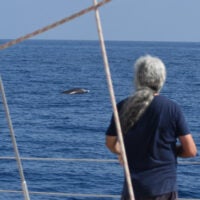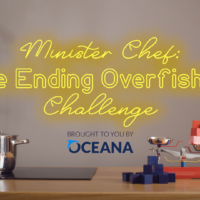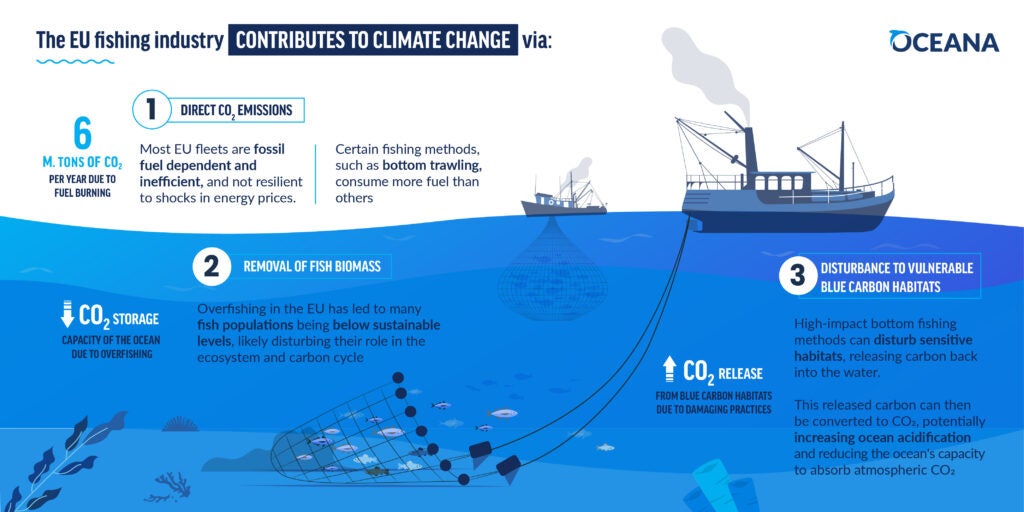Sustainable Fisheries
Paving the way for low-impact fisheries
EU countries should reduce the environmental impact of their fisheries by adopting a roadmap towards carbon neutrality in the sector and increasing quotas for low-impact operators.
SHARE TO SHOW YOUR SUPPORT:
Overview
Oceana campaigns for the EU fishing sector to transition to a low-impact, climate-smart future. Our goal is to achieve more abundant fish stocks – more resilient to the impacts of climate change; a lower carbon footprint of EU fishing fleets; and more selective fishing, with reduced by-catch and less damage to habitats.
Higher opportunities for low-impact fishers
Oceana campaigns to incentivise sustainable, low-impact fishing practices across Europe.
The Common Fisheries Policy legally requires EU countries to allocate fishing opportunities to their fleets using transparent and objective criteria, including those of an environmental, social, and economic nature.
But research by Oceana has revealed that countries tend to give greater access to fishing opportunities to vessels that have a history of fishing the most (known as historical catches). In doing so, they mostly disregard the damage caused to marine habitats and species and sideline the importance of the vessel in terms of local job creation.
This favours industrial, destructive fleets – like bottom trawlers – over small-scale, low-impact vessels. And it’s not the European Union deciding this, but each country individually. Oceana is urging EU countries to be more transparent about their criteria when allocating fishing opportunities to their fleets and to prioritise access to vessels that have minimal impact on the marine environment, provide sustainable seafood, and increase employment.
Energy transition for the fishing fleet
One of the biggest challenges of our time is climate change, with some of the most severe threats manifesting themselves in the ocean, such as warming waters, ocean acidification, and biodiversity loss. At the same time, by absorbing 90% of excess heat and capturing carbon more efficiently than forests per unit area, the ocean is our greatest ally in mitigating climate change.
The climate crisis necessitates all sectors to decarbonise, and the EU’s energy transition initiative can improve the sustainability, economic profitability, and resilience of the fisheries sector in Europe.
Under the Green Deal, Europe has committed to becoming the first climate-neutral continent by 2050 and to cutting greenhouse gas (GHG) emissions by at least 55%, compared to 1990. In the fishing sector, this translates to a reduction of 30%, compared to 2005 levels, by 2030.
To reach a neutral CO2 footprint, all sectors must play their part in emitting less and protecting natural ecosystems (like the ocean) so they absorb more carbon. The fisheries sector should be no exception, particularly given its dependence on the Good Environmental Status of the ocean.
In February 2023, the European Commission proposed actions to promote a climate-neutral and resilient EU fisheries sector by 2050. Oceana recommends the following measures to help the EU achieve its goals:
- Get EU Member States to create national energy transition plans, which include legally-binding measures to reduce the sector’s GHG emissions
- Make technological improvements and the uptake of renewable energy fuels and propulsion mandatory for the EU fleet to help it transition towards sustainable fishing practices that limit the impact on the marine environment
- Prioritise the allocation of fishing opportunities to less environmentally damaging, low-impact fisheries
- End overfishing and adopt an ecosystem-based approach to fisheries management to recover fish stock abundance, allow fish to maintain their role in the carbon cycle, and improve their resilience to external shocks like climate change
- Restrict bottom trawling over blue carbon habitats to preserve their important carbon capturing role
- Ensure equitable access to EU funds to help the fisheries sector, including small-scale ones, transition to carbon-friendly techniques
Watch the video:
News & Reports
Press Releases
Blog

April 14, 2025

January 17, 2025

November 29, 2021
Reports
Around the Web


